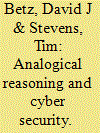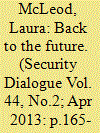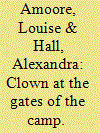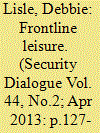|
|
|
Sort Order |
|
|
|
Items / Page
|
|
|
|
|
|
|
| Srl | Item |
| 1 |
ID:
119953


|
|
|
|
|
| Publication |
2013.
|
| Summary/Abstract |
This article is an attempt to interrogate some of the predominant forms of analogical reasoning within current cyber-security discourse, with a view to clarifying their unstated premises, major strengths and, vitally, points of conceptual failure. It seeks to improve dialogue between and across the various epistemic communities involved with cyber-security policy. As we seek to adapt to the new security realities of the information age, it is incumbent upon scholars and strategists to address the benefits of connectivity, in all its dimensions, as much as the threats it presents. Current cyber-security discourse channels us into a winner-takes-all modality that is neither desirable nor necessary in the current strategic reality.
|
|
|
|
|
|
|
|
|
|
|
|
|
|
|
|
| 2 |
ID:
119954


|
|
|
|
|
| Publication |
2013.
|
| Summary/Abstract |
Contemporary debates about security narratives highlight different forms of security: gender security, realist security or human security. The use of such terms often means that we do not recognize subtle variances within these narratives or the implications of these divergences. This article suggests and illustrates a way of achieving a deeper understanding of security narratives through investigating the temporal aspects of narrative content. A case study exploring three forms of gender security narratives among activists of feminist and women's organizations in Serbia is used to demonstrate that similar perceptions of gender security exist. However, paying attention to the temporal discontinuities within the contents of these gender security narratives makes it possible to identify divergences connected to personal-political imaginations of conflict and post-conflict. These subtle variations in content are potentially product and productive of different policy prescriptions and outcomes. This article concludes by reflecting upon the presence of our past and future in the contents of our contemporary security narratives, suggesting that when we consider security, our analysis should aim to incorporate an understanding of the temporal nature of a security narrative.
|
|
|
|
|
|
|
|
|
|
|
|
|
|
|
|
| 3 |
ID:
119950


|
|
|
|
|
| Publication |
2013.
|
| Summary/Abstract |
This article considers the figure of the clown-fool as a way of approaching anew contemporary practices of sovereignty and resistance. The spectre of the camp as the nomos of modern sovereign power is widely critiqued for its neglect of the thriving and teeming life that actually accompanies the declaration of exception. The clown is an errant and troublesome figure whose life haunts the sovereign decision on exception. His presence in border-camp activism invokes a rich, provocative history in which the clown's foolish wisdom has critiqued the conceits of power. Yet, the clown's significance exceeds his traditional associations with carnivalesque misrule and mockery. Like homo sacer, the clown occupies an ambiguous position between political inclusion and exclusion, between inside and outside. In short, the sovereign needs the clown. His relation to resistance is thus also complex. The clown does not turn to face a locus of power as though it could be countered or overturned. Rather, he is the example par excellence of the resistance always already present within the exercise of power: standing not inside or outside the gates, but looking through, he dwells within the court but is not of its making. As a singularity akin to Deleuze's figurative children and Agamben's tricksters, the clown troubles the division between interior and exterior on which sovereign political life rests, a division that is also frequently replicated in understandings of resistance.
|
|
|
|
|
|
|
|
|
|
|
|
|
|
|
|
| 4 |
ID:
119952


|
|
|
|
|
| Publication |
2013.
|
| Summary/Abstract |
This article argues that the terrorist bombings of hotels, pubs and nightclubs in Bali in October 2002, and in Mombasa one month later, were inaugural moments in the post-9/11 securitization of the tourism industry. Although practices of tourism and terrorism seem antithetical - one devoted to travel and leisure, the other to political violence - this article argues that their entanglement is revealed most clearly in the counter-terrorism responses that brought the everyday lives of tourists and tourism workers, as well as the material infrastructure of the tourism industry, within the orbit of a global security apparatus waging a 'war on terror'. Drawing on critical work in international relations and geography, this article understands the securitization of tourism as part of a much wider logic in which the liberal order enacts pernicious modes of governance by producing a terrorist threat that is exceptional. It explores how this logic is reproduced through a cosmopolitan community symbolized by global travellers, and examines the measures taken by the tourism industry to secure this community (e.g. the physical transformations of hotel infrastructure and the provision of counter-terrorism training).
|
|
|
|
|
|
|
|
|
|
|
|
|
|
|
|
| 5 |
ID:
119951


|
|
|
|
|
| Publication |
2013.
|
| Summary/Abstract |
Focusing on a highly significant governmental intervention in the global financial market crisis - the US Treasury Department's Troubled Assets Relief Program (TARP) of autumn 2008 - this article makes a threefold contribution to the growing literature concerned with the interstices of finance and security. First, the TARP is shown to have attempted to govern the turbulence not simply as a crisis of the markets, the banks and Wall Street, but as a problem of the biopolitical security of the US population. US$700 billion worth of toxic assets were to be purchased by the TARP in order to restore the opportunities afforded by uncertain global financial circulations for individual wealth and well-being. Second, by conceptualizing and exploring the TARP in Foucauldian terms as an 'apparatus of security', the article demonstrates how this concept can hold together analytical concerns with the biopolitical rationality of power, on the one hand, and the contingent, processual and lively forms taken by specific governmental orderings, on the other. The TARP apparatus certainly amounted to a biopolitical intervention in the crisis, but it only emerged from the relation between the discursive, material and institutional elements that made it possible. Third, the unplanned transformation of the TARP into an apparatus that targeted bank solvency and recapitalization rather than toxic assets is held, in effect, to have been a key moment that heralded a move towards techniques of preparedness and resilience designed to mitigate the dangers of uncertain global financial circulations.
|
|
|
|
|
|
|
|
|
|
|
|
|
|
|
|
|
|
|
|
|